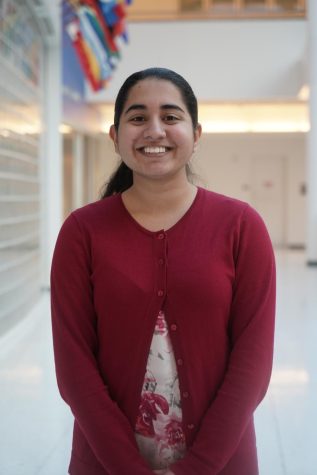Macy discusses addiction in new novel, Dopesick
October 28, 2019
Beth Macy, the journalism department’s Sidney Harman Writer in Residence for this year and reporter of 30 years, discussed her latest novel, Dopesick: Dealers, Doctors, and the Drug Company that Addicted America with students on Oct. 22.
Macy has won more than a dozen national writing awards, including a Nieman Fellowship for Journalism at Harvard University, has three best-selling novels and wrote profiles for The New York Times.
Her conversation was part of the Harman Writer in Residence program that calls esteemed writers to campus every year to teach a master class. Before she began, Macy gave condolences for anyone present who had lost someone to the opioid epidemic, as this is the topic of her book. She explained how she accumulated stories from the officer who first reported oxycontin sales on the black market, the families of victims, crusading nuns and doctors and even drug dealers.
“Drug overdose [has] already taken the lives of 300,000 Americans in the past 15 years, and experts now predict that 300,000 more will die in just a few years,” Macy said.
She explained the rise of opioids in her home state of Virginia and how the influx of kids’ deaths due to it sparked her to investigate.Essentially, Macy preached an idea of “[embracing] harm reduction over tough love.” Instead of seeing drug addicts as lost causes, Macy encourages people to see them as human beings fallen victim to Big Pharma’s lies.
This became most clear from when she discussed Tess, an addict who was found murdered in a trash bin. Macy was so distraught over the loss that she said, “I put down my notepad and had to be a person first.”
She played a clip from her podcast on Audible, Finding Tess: A Mother’s Search for Answers in a Dopesick America, and as Tess began to explain “dopesick,” or withdrawal symptoms, Macy clutched her necklace. She listed ways to fight the opioid epidemic, such as expanding and improving drug courts so people can get treatment without the requirement of being arrested. She also mentioned that anyone can help. For instance, a 27-year-old lawyer fought and eventually succeeded in instilling a mandatory nine-hour session on treatment for people in custody, as well as job placement. Social workers also aid in the decision of whether or not someone should go to jail. Though the event was over within an hour, it lasted significantly longer as inquisitive students asked her questions ranging from “how is the crisis in America worse compared to other countries?” to how to become a nonfiction writer themselves.
When asked about the experience, student Catherine Goffman commented that though she knew of the opioid crisis plaguing America, Macy’s stories of it have the power to, “Wake you up, make you feel not just guilty but angry.”
Macy detailed not just the impact opioids have had on the nation and how she sought to expose it, but how to maintain objectivity as a journalist and still have a heart as a person.






